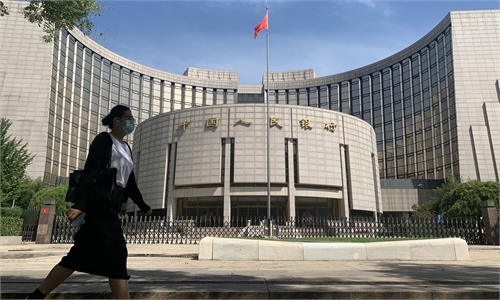Overseas financial entities quicken pace in establishing presence in China as market brims with huge potential
Market brims with potential despite short-term underperformance of A-shares: experts

A view of the Lujiazui area in Shanghai Photo: VCG
Overseas financial institutions have continued their expansion into the Chinese market as the new year unfolds, continuing a years-long trend. Despite the short-term underperformance of A-shares, experts stress the vast scale and significant growth potential of the market, noting that the investment opportunities cannot be overlooked by global asset managers.
"China continues to be the world's second-largest economy and wealth creation hub and is a key market for UBS. We remain committed to our onshore growth strategy," Colm Kelleher, UBS Group AG's chairman of the board, said at its 24th Greater China Conference on Tuesday.
"We've been through a lot and are more committed to China than ever," Eugene Qian, China country head of UBS, said at the conference.
On January 2, US asset management firm AllianceBernstein announced that its wholly foreign-owned enterprise, AllianceBernstein Fund Management Co (AB China), had been granted a license to conduct securities and futures business in China by the China Securities Regulatory Commission (CSRC).
"We have established a local talent team, equipped with strong research and investment capability, and a deep understanding of onshore investors' needs, to explore and seize the vast investment opportunities in the Chinese market," Alex Qian, general manager of AB China, said in a press release the company sent to the Global Times last week.
Other overseas institutions expanding their footprints in China recently included Singapore-based DBS Bank, Standard Chartered Securities and various Middle Eastern capital entities.
Yang Delong, chief economist at Shenzhen-based First Seafront Fund Management Co, told the Global Times that recent moves by leading overseas financial institutions to expand their presence in China sent a positive signal about the market, and also debunked absurd hype by foreign media outlets suggesting that overseas capital was withdrawing from China.
China's economic recovery is expected to see stronger momentum in 2024, especially as further pro-growth policies unfold, and the recovery may exceed the expectations of many. As a reliable indicator of economic trends, the capital markets are poised for strength, Yang said.
Last year, 81 overseas institutions were approved to do Qualified Foreign Institutional Investor business in China, which spanned across 15 countries, regions and international organizations worldwide.
The figure, second only to 118 institutions in 2021, marked the second-highest level since 2003, according to CSRC data.
During the key central financial work conference held in Beijing in late October 2023, Chinese leaders vowed to promote high-standard financial opening-up and ensure national financial and economic security.
"With equal emphasis on 'bringing in' and 'going global,' we should steadily expand institutional opening-up in the financial sector and facilitate cross-border investment and financing, so as to attract more foreign financial institutions and long-term capital to invest and operate in China," the meeting said.
China has announced more than 50 opening-up measures in the financial sector in recent years - completely eliminating foreign ownership limits in the banking and insurance sectors, significantly reducing quantitative thresholds for foreign entry, and continually expanding the breadth and depth of financial opening-up, Li Yunze, head of the National Financial Regulatory Administration, said in a forum held in Beijing in November.
"All 30 globally systemically important banks have established operations in China, and nearly half of the world's largest 40 insurance companies have entered the market," Li said.
Local governments have also spared no effort in promoting financial opening-up. For instance, Chengdu in Southwest China's Sichuan Province and Southwest China's Chongqing Municipality have joined hands to establish a "Western Financial Center," aiming to create a financial gateway in the western part of the country that is oriented toward East Asia, Southeast Asia, and South Asia.
While the performance of the A-share market in China hasn't been particularly outstanding in recent years, it is a short-term situation, Xi Junyang, a professor at the Shanghai University of Finance and Economics, told the Global Times on Tuesday.
The potential for China's stock and capital markets remains significant. This is attributed to China's overall leading position in global economic growth, offering plentiful investment opportunities. Coupled with the vast scale of the market itself, there is substantial room for growth, Xi noted.
The opening-up of China's financial markets is consistent with the broader national goal of economic opening-up, and is expected to deepen, Xi said, adding that the increased participation of foreign capital in China's financial markets is an inevitable outcome.



